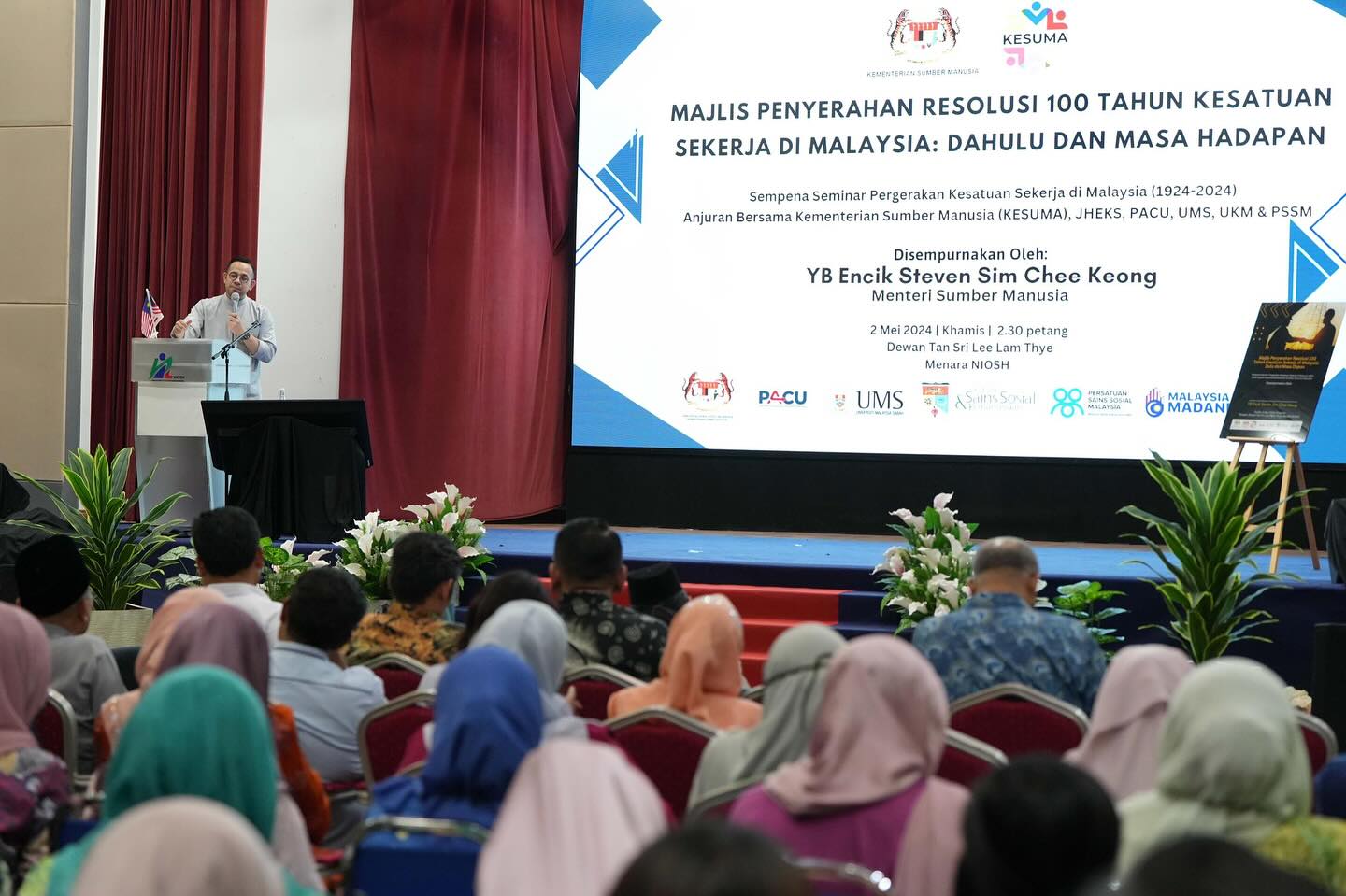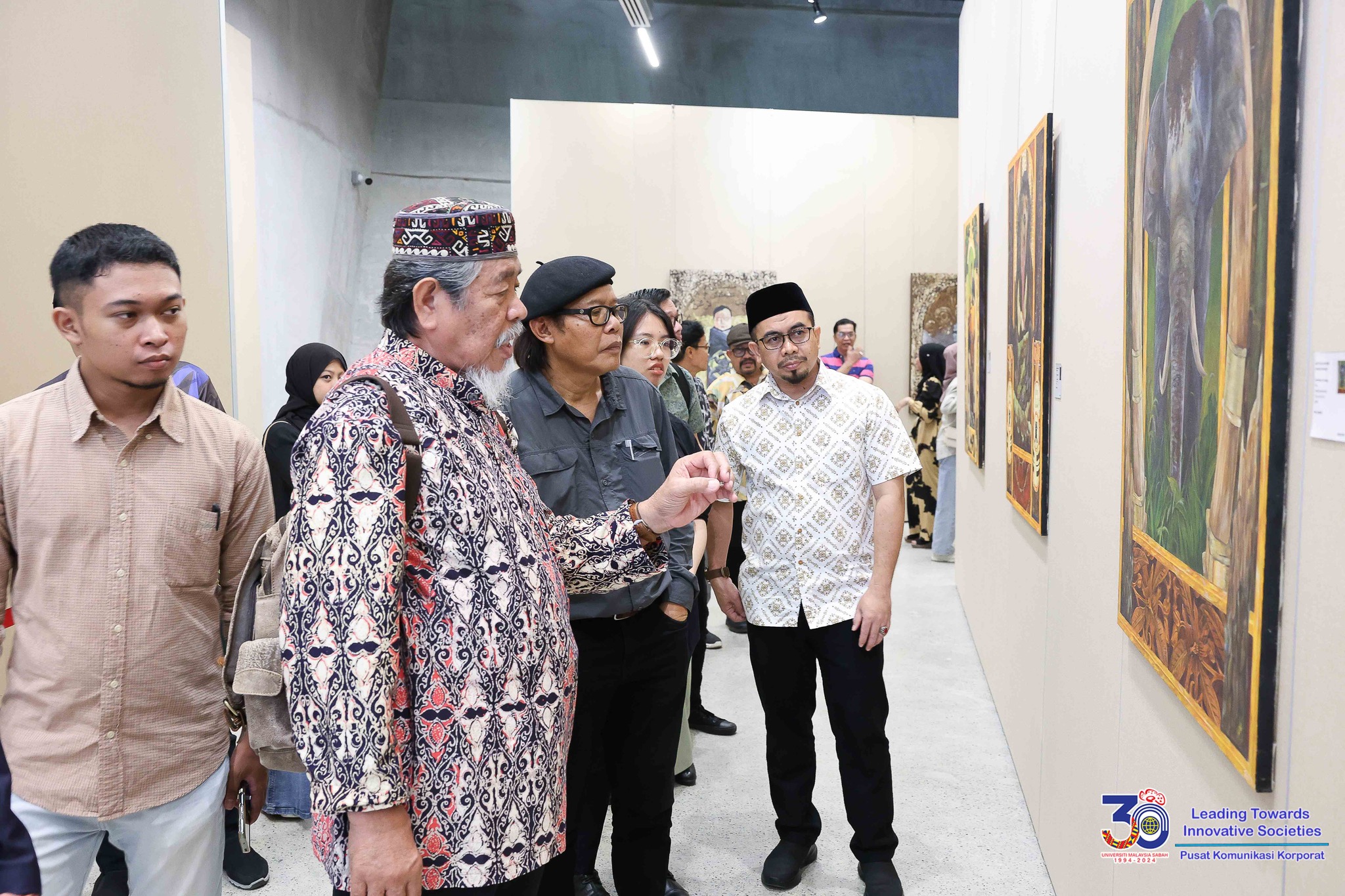
The Faculty of Social Sciences and Humanities (FSSK) of Universiti Malaysia Sabah (UMS) played a key role in the successful organization of the Seminar Pergerakan Kesatuan Sekerja Di Malaysia (Trade Union Movement in Malaysia) held in conjunction with the 2024 National Workers' Day celebrations at the National Institute of Occupational Safety and Health (NIOSH) in Bangi.
The seminar, themed “Pekerja KESUMA Bangsa,” was co-organized by the Ministry of Human Resources (KESUMA), Universiti Kebangsaan Malaysia (UKM), the Department of Trade Union Affairs (JHEKS), the Performance Acceleration Coordination Unit (PACU), and the Malaysian Social Science Association (PSSM).
Dr. Mahadirin Ahmad, the chairman of the organizing committee and a lecturer at FSSK UMS, emphasized the importance of the seminar in discussing the future of trade union movements in Malaysia.
“The seminar aligns with the empowerment agenda for workers in line with the Malaysia Madani framework and the 12th Malaysia Plan (RMK-12), as well as the theme of this year’s Workers' Day: Pekerja Kesuma Bangsa,” he said.
Dr. Mahadirin also noted the presentation of the Resolusi 100 Tahun Kesatuan Sekerja Di Malaysia: Dulu dan Masa Depan (100 Years of Trade Unions in Malaysia: Past and Future Resolution) at the event.
The seminar attracted participants from various backgrounds, including trade unions, employers, academics, and students, contributing to the sustainability of knowledge in the field of workers' empowerment.
Minister of Human Resources, Steven Sim Chee Keong, expressed his support for the seminar, highlighting its importance in evaluating the achievements and relevance of trade unions in Malaysia today.
“The seminar is in line with KESUMA’s strategic 3K mission—Welfare, Skills, and Productivity of workers,” Sim said. "It is hoped that the seminar will gather and unify perspectives, particularly from trade unions, as workers play a crucial role in labor relations in this country."
He also announced that three resolutions were reached during the seminar, which is enhanced solidarity and collective action among trade unions, greater engagement and activity by trade unions and workers, and encouragement of reading, knowledge expansion, and critical thinking among workers and unions.
These resolutions reflect the shared priorities of trade unions in the country to advocate for workers' rights and interests.
Nearly 200 participants from public, private, and statutory sectors attended the seminar held at the Tan Sri Lee Lam Thye Hall, NIOSH Tower.
Academic staff and researchers from FSSK UMS involved in the seminar included Dr. Kee Y Sabariah Kee Mohd Yussof, Dr. Norhuda Salleh, Bazley Bee Basrah Bee, and FSSK master's student Nassiah Gaong. The seminar was also supported by lecturers from FSSK UKM, Dr. Sharifah Nursyahidah Syed Annuar, and trade union researcher Engrit Liaw.
 Head of State, Tun Dr Juhar Mahiruddin graced the Universiti Malaysia Sabah (UMS) Hari Raya celebration at the Dewan Kuliah Pusat Ke-2 Complex.
Head of State, Tun Dr Juhar Mahiruddin graced the Universiti Malaysia Sabah (UMS) Hari Raya celebration at the Dewan Kuliah Pusat Ke-2 Complex.




 The "Pameran Petak Pertama" exhibition, organized in collaboration with the Academy of Arts and Creative Technology (ASTiF) Alumni of Universiti Malaysia Sabah (UMS) and the Azman Hashim Gallery UMS (GAH-UMS), served as a platform for emerging artists to take their first steps into Malaysia's art industry.
The "Pameran Petak Pertama" exhibition, organized in collaboration with the Academy of Arts and Creative Technology (ASTiF) Alumni of Universiti Malaysia Sabah (UMS) and the Azman Hashim Gallery UMS (GAH-UMS), served as a platform for emerging artists to take their first steps into Malaysia's art industry. Universiti Malaysia Sabah (UMS) recently hosted the Majlis Alumni Universiti Awam (MAlumni) 2024 Strategic Workshop, welcoming alumni representatives from public universities across Malaysia.
Universiti Malaysia Sabah (UMS) recently hosted the Majlis Alumni Universiti Awam (MAlumni) 2024 Strategic Workshop, welcoming alumni representatives from public universities across Malaysia.